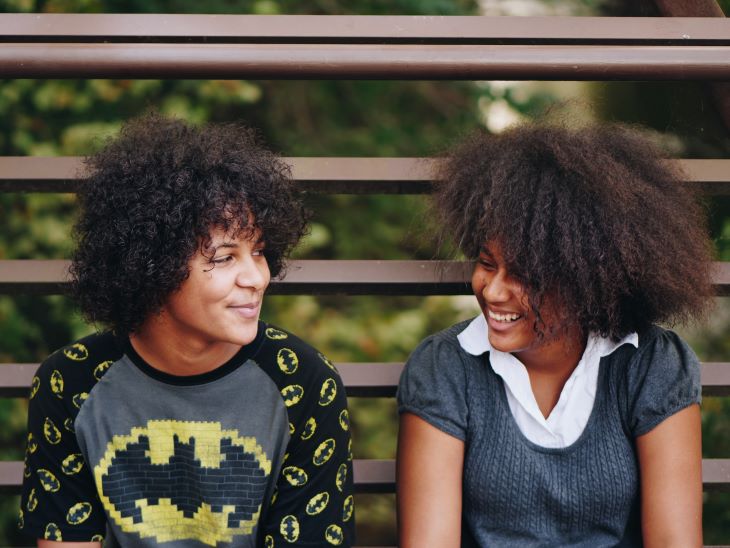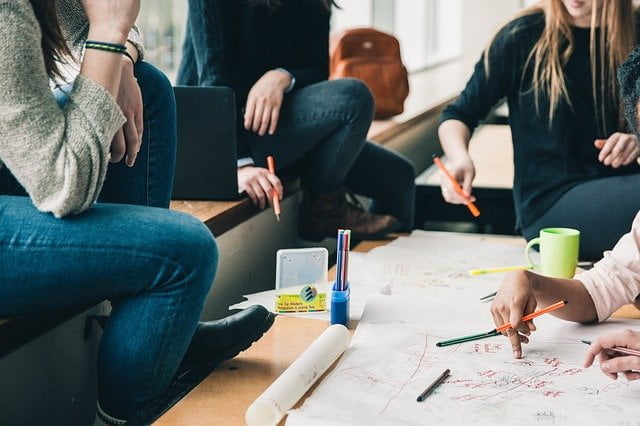Making Friends in Recovery
While it’s important to focus on yourself during and after addiction treatment, making friends in recovery and providing support to others is a great way to stay accountable and increase your chances of long-term sobriety.
We understand that it isn’t always easy to make friends as an adult, particularly if you are struggling with low self-worth and fear of rejection.
Our complete guide to making friends in recovery will teach you how to make good friends, the red flags to look out for in friendships and how new sober friends can be a positive asset to your recovery.
Why is it important to make sober friends in recovery?

You may think you can do this all by yourself, but the truth is that good friends can make the process of recovery much easier and even fun at times.
Having someone to express your feelings to, share experiences and find support in can make a world of difference. Studies have found that the likelihood of relapse after addiction treatment decreases based on the amount of social support you receive. [1]
Friends can also be a great distraction from cravings – they can take you to a movie or simply be there to listen and understand.
Remember, the best friends you can make in recovery are those who are equally committed to sobriety and are actively taking steps to prevent relapse.
How to make friends in recovery
Are you ready to make new friends but don’t know where to start? Our handy guide will help you navigate friendships in recovery and give you the confidence to take the first step.
1. Know what you have to offer
It can be scary to make yourself vulnerable to others, and you may be worried about rejection when attempting to make new friends in recovery.
To help build your confidence, think about your strengths and what you could bring to a friendship. Maybe you’re a good listener or have a knack for organising fun social outings – if you really think about it, you’ll find at least one or two qualities that make you a great friend to have.
2. Choose quality over quantity
It’s better to have one or two close friends that you can count on compared to hundreds of acquaintances who don’t really know you that well.
Be picky with the people you allow into your life. You deserve to have friends that build you up, support you and can be relied upon. One survey showed that British people have less than ten friends, so don’t let those huge Facebook friends lists fool you. [2]
3. Say yes to invitations
Being more open to spending time with people is a great way to make friends.
If you constantly reject invitations, you may find that you start receiving fewer offers.
It’s important to find a healthy balance between spending time alone and spending time with others – while you should never put yourself in situations that could jeopardise your recovery, there’s nothing wrong with having dinner with new people or accepting an invitation to a cinema outing.
4. Find new opportunities
Sitting around at home all day and waiting for a new friend to walk through the door isn’t the best way to spend your time.
Instead, put yourself out there and try new activities. This could be as simple as joining a fitness class, volunteering at your local animal shelter or coaching a sports team.
AA and NA support groups are great places to meet people with the same sobriety goals, which is another good reason to attend regular meetings.
5. Get to know acquaintances
If the idea of meeting completely new people makes you nervous, how about building on the relationships you already have?
Try inviting casual acquaintances to low-pressure social occasions such as lunch or a games night.
With time and a bit of effort, these people could become close friends – or they could introduce you to other people who end up becoming your close friends.
What is a healthy friendship in recovery?

It’s important to remember that you don’t have room in your life for people who don’t support your recovery.
That said, there are many people out there who can assist you in your sobriety journey. These are healthy friendships, and we have listed some of their characteristics below.
1. They don’t use substances
Your recovery will be ongoing throughout your entire life, so it’s important to surround yourself with people who support this. [3]
Finding friends who don’t use drugs and alcohol can help you to stay sober, as they will be more likely to engage in activities that don’t involve substances and help you to normalise sobriety.
2. They hold you accountable
It can be surprisingly difficult to hold people accountable, even when they are your close friends.
When you find someone who is willing to tell you when they have concerns about your recovery, this is a sign of a healthy friendship. This support can keep you on track even through the hardest times, and just knowing you have someone in your corner can make it a little easier to stay sober.
3. They have shared interests
Many people find that their old friendships were built primarily on substance use, and once they no longer use drugs or alcohol they don’t have much in common.
Healthy friendships involve people that share your interests and hobbies, whether that’s watching old movies or playing football.
Having activities to do with friends that don’t involve substances can be a great foundation for a lasting friendship.
What is an unhealthy friendship in recovery?
Unfortunately, not all your old and new friendships may be good for you.
You need to surround yourself with people who support you and your recovery, and learn to spot the signs of an unhealthy friendship in recovery before you get sucked in.
Some of the most common signs of an unhealthy friendship are listed below.
1. They use substances around you
If your friends use drugs or alcohol in your presence despite knowing about your recovery goals, this is a sign of an unhealthy friendship.
Even if your friends want to continue using substances, they should respect you and your recovery enough not to do so when they are not spending time with you.
2. They try to get you to use drugs or alcohol
Some people may try to convince you to use drugs or alcohol even when you are in recovery.
They might use excuses such as, ‘just one time won’t hurt’ or ‘you’re more fun when you drink.’ This may be due to their own insecurities or simply a lack of understanding about the importance of recovery.
Either way, it is not a healthy friendship.
3. They make you feel ashamed or self-conscious about recovery
When someone attempts to make you feel bad about being sober and working hard on your recovery, it’s a sure sign that they don’t have your best interests at heart.
If your friend makes fun of you for being sober or tells you that you’re overreacting, your recovery goals may suffer unless you distance yourself from them. This can be particularly difficult if it’s an old friend, but you need to put yourself and your recovery first.

So, you’ve recognised that a friendship is unhealthy. This is a great step towards raising your self-esteem and self-respect, and it’s important to navigate the situation carefully.
Whether this unhealthy friendship is a new friend you’ve met in recovery or an old friend you’ve known your entire life, this process is difficult but necessary.
The most effective way to navigate an unhealthy friendship is to develop and set boundaries for yourself.
For example, if you’ve noticed a friend encouraging you to use drugs or alcohol with them, this boundary may be ‘I will not spend time with people who sabotage my recovery in any way.’
You are completely within your right to distance yourself from someone for any reason. However, you may wish to speak with your friend and give them a chance to recover the friendship.
Make your boundaries clear and see if the friend respects them and changes their behaviour. If they don’t, you can move on from them safe in the knowledge that there are other people out there who will support you in your recovery.
How to balance your old friends with your new sober friends
Many people find they have more in common with the friends they make in recovery than their old friends.
Of course, if your old friends encourage you to use substances or don’t take steps to support your recovery, it’s essential that you distance yourself.
But if you have good, supportive old friends, you’ll need to learn how to balance these relationships with the new people you meet during your recovery.
You may want to bring these two groups together, and you can do this by organising an informal BBQ or games night at your home – anything that fosters teamwork and bonding.
We don’t recommend bringing your old friends to addiction support meetings – these groups are primarily for people to share their struggles and experiences with addiction, and it can be uncomfortable to do this in the presence of other people.
Above all, keeping in regular contact with both your old and new friends is essential to balancing these relationships. This may involve a weekly lunch date, regular phone calls or staying connected through email and social media.
What are the pros and cons of making friends in recovery?

It’s not all sunshine and rainbows when making friends in recovery – if you’re not careful, your good intentions could potentially sabotage your sobriety.
Pros of making friends in recovery
- Finding friends with similar sobriety goals can help keep you motivated and on track with your recovery
- Having a sense of community can go a long way in your recovery and will help you to heal and grow over time [4]
- Knowing you have people who care about you can raise your self-esteem, particularly if you have never experienced healthy friendships before
- Good friends can be a great distraction from cravings and compulsions, as they can get you out of the house or simply provide a listening ear
- They can help you feel less alone as they likely know understand what you’re going through
Cons of making friends in recovery
- The possibility of forming romantic relationships, which could distract from or even inhibit your progress
- You may begin to rely on other people for support and guidance, which could prevent you from developing your own self-validation skills
- It’s easy to compare yourself to others and where they are in their recovery journey, which could discourage you
- The risk of meeting people who do not support your recovery and may actively try to sabotage you, whether consciously or unconsciously
- Focusing too much on new friendships could distract from your recovery – it’s important to focus on yourself during this time
While there are some risks involved with making friends in recovery, the benefits far outweigh the negatives.
If you understand what a healthy friendship looks like and remember to prioritise your recovery above all else, making friends can help you recover from addiction and build a life you can feel proud of.
Put your recovery first with Rehab Recovery
You can take the first step towards recovery right now by calling Rehab Recovery on 0800 088 6686.
We are a free service for anyone struggling with addiction, providing high-quality advice as well as a referral service that matches you with the best rehab clinic for your individual needs.
Rehab Recovery has connections to some of the top rehab clinics in the country. We understand that your lifestyle and budget will affect the type of treatment you can access and will adapt our referrals to match what you need.
Whether you are struggling with alcohol addiction, drug addiction or a behavioural addiction such as gambling or sex addiction, our team are here to support and guide you towards recovery.
References
[1] https://www.ncbi.nlm.nih.gov/pmc/articles/PMC10843353/
[2] https://yougov.co.uk/society/articles/38493-yougov-friendship-study-part-1-close-friends-and-b




